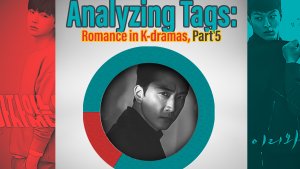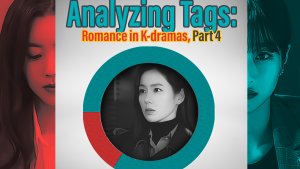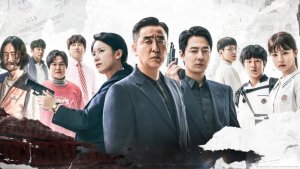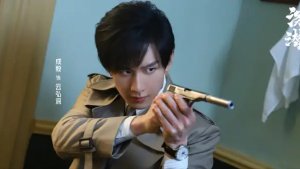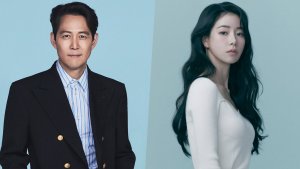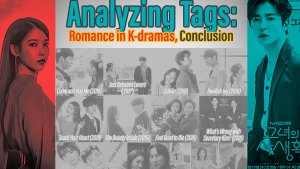 A Tag Analysis: Romance in K-Dramas - Conclusion
A Tag Analysis: Romance in K-Dramas - Conclusion
[Disclaimer: This article conveys my impressions based only on the TV drama, not the webtoon --which I haven't read and, as such, know very little about. It's also worth noting that the plot description has minor spoilers for the first couple of episodes, which was necessary to provide a better idea of the show's premise.]
We all have different tastes so my thoughts regarding Feel Good to Die may not necessarily resolve your doubts. I've rated popular dramas lower than the general consensus and unpopular dramas much higher, after all. So rather than focus only on the things I enjoyed about the show, I’ll add flaws to consider as well. In so doing, I hope you'll be able to determine if this is a good fit for you or whether you’d be wiser spending your time elsewhere.
So, with that said, here are five reasons why you may want to give Feel Good to Die a watch!
If you're expecting the writers to get very scientific about the time-loop, or to at least explore/exploit the butterfly effect… then you'll probably feel disappointed. This show isn’t sci-fi. In fact, it defies logic at times... but that’s exactly why it's charming.
The time-loop here is implemented as a plot device in order to give our main characters a chance to learn from their mistakes and grow. Another thing to keep in mind is that this is first and foremost a satire. Which means, the writers will wittily point out a k-drama cliché while simultaneously integrating it into the story. But the drama gets away with it because we're all in on it --the writers, the characters and even us, the audience-- which transforms what should be hypocritical into cleverly ironic. The result is hilarious because the whole thing has been written to be absurd in the first place.

Now, before we proceed, I feel the need to point out the difference between a parody and a satire because up until a certain point, I'd tagged this show as the former... but it's not.

This is a satire because rather than imitate and make fun of something that has already been done (other k-dramas rom-coms, for example), Feel Good to Die uses humor to expose the shortcomings and flaws of the characters and the toxic work culture that's a recurrent problem in South Korea. It also touches upon other important subjects, such as the unfairness of traditional gender roles and how easily people in authority abuse their power.


Additionally, this drama excels in building up its moments, exploding them into a big reveal we may or may not have seen coming. This is a show with a lot of heart with those moments setting the rhythm of its beats. Even if the writers broach difficult subjects through humor, they're careful to smoothly change the tone when it's time to deal with them. In so doing, those subjects are handled with the sobriety they deserve. As a bonus, it's worth noting that the drama accomplishes this without weighing the story down with melodrama.
╮("╯_╰)╭ Flaws to consider ╮(╯_╰")╭
- The Humor | The humor may not be everyone's cup of tea. It's a humor that relies on the ridiculous and the absurd to work. So if you didn't enjoy the first 4-6 episodes or found the humor incredibly silly, then this may not be the show for you.
- Theatrical Acting | Because this series relies on "the absurd", the characters may sometimes come across as cartoon-like.
- The Love Triangle | This aspect plays a role during most of the drama and, though I'll cover this later, it's probably the weakest part of the story. So if you're not a fan of love triangles, this one may test some of your patience.

Another thing this drama offers is an interesting plot that's fun to watch despite tackling some petty complicated social issues. So let's briefly go over the plot.

Lee Roo Da (our charismatic female lead) works at a company where she strives to meet the minimum requirements of her job in order to sail by without wasting too much of her energy. This means that, while she accomplishes her tasks, she neither shows initiative nor goes the extra mile. Or as her boss, Baek Jin Sang, (our socially inept but surprisingly complex male lead) puts it:
"She does what she's told on an average scale. That only implies that she has no passion, love or interest for the company... So I can't expect more from her in the future."
[Baek Jin Sang to Director Na, regarding Lee Doo Ra, episode 1]
Baek Jin Sang, on the other hand, loves doing his work “by the books” and always strives to accomplish everything he's set out to do in the most efficient way possible. He's arrogant, rude, incredibly narcissistic, and has neither the intention nor the skill to sugar-coating things. Much to Lee Roo Da and her coworkers’ annoyance, he also believes honesty is the best currency. Unfortunately, said honesty comes with an extra dose of brutality.
In fact, we see him abusing his authority when dealing with his employees in most of his early interactions in the drama. And he's not ignorant about the subject since he even gives a spontaneous lesson about "abuse of authority in the workplace" during episode 3, which marks how disconnected he is from his own situation.
But I digress... let's get back on track, shall we?
One day, Roo Da witnesses Baek Jin Sang getting into an accident that results in his death. Moments later, she's woken up by her alarm clock signaling the start of a new day. Chalking the whole thing up as a nightmare, Roo Da goes about her day only to realize that the events of her nightmare are playing out exactly as she remembers them, down to her boss' grim death!
It takes her a while to gather her bearings, but when she does Roo Da is forced to come to terms with the unfortunate truth... she's caught in a time loop!
╮("╯_╰)╭ Flaws to consider ╮(╯_╰")╭
- Antagonists | We come across four antagonists, with three of them written two dimensional and borderline cartoony. But, to be frank, their role in the series is merely to place obstacles for our leads. And in that regard, they do accomplish their job.
- Weak setting | This is a character-centrist and character-driven show, so the plot-line regarding MW Foods' and MW Chicken's bad management is somewhat messy. It's only by episodes 23-24 that we get some real development from that plot-line. Though I'm adding this to the flaws section, I'm honestly fine with this point since I don't really care about it. At the very least, it's explored enough to provide the setting for the story without getting sidetracked with unneeded complexity.
- Time Loop | We really don't get an explanation about how it began or why it stopped. As I've established, there's nothing scientific about it. Instead, it's used as a plot device with a short and very convenient explanation (in a short conversation during the last episode) as to why it caught Lee Doo Ra instead of only entrapping Baek Jing Sang.

The writing is indeed strong with this one. You can tell there was a lot of care in structuring the story, ensuring we gain insight into events we've already seen by cleverly using Lee Roo Da's entrapment.
Because as she works to escape her prison we, alongside her, discover that not everything is as it seems.
Forced to relive the same day, Roo Da pays attention those around her for the very first time. Like an onion, she peels away the layers of the looping day, eventually getting to the truth buried within. In so doing, she realizes that for every action, there's a consequence and for every decision, a price.
And this is where the show shines. It's the emotions that surface from beneath the absurd humor that elevates the storytelling. To the point that, as the story unravels, it's not just the characters who are served a hefty dose of food for thought... but us with them.

"I was sick of today, and I couldn't wait for tomorrow to come. But... what did I even know about today? I always took tomorrow for granted, but maybe that's only for people who spent today to it's fullest."
[Lee Doo Ra, reflecting about her day, episode 2]
It's in those moments of self-reflection that we see characters hold themselves accountable for their actions, allowing them to grow in a conscious and organic way. And that, in and of itself, sets this show apart from many others.


And the fact that characters are self-aware, held accountable, capable of change and growth as they face problems, mistakes, and insights isn't something just reserved to the main leads. This attention to detail and consistency also extends to some of the support characters as well.
Furthermore, the show manages to also present an interesting critique of South Korea without it feeling forced or out of place. It makes a special emphasis on the toxicity of their work culture, but it also covers other noteworthy subjects such as the difficulties of being part-timers and temporal workers, the pressure of being the head of the family, taking responsibility, the effects of emotional abuse, the importance of labor unions and the value of life.
╮("╯_╰)╭ Flaws to consider ╮(╯_╰")╭
- Convenience | As is the nature of the beast, sometimes things happened in a very convenient way in order to move the plot along. But at the very least (save for one aspect which I'll cover later on) nothing felt like it came out of nowhere.
- Character inconsistency | This one only becomes apparent in the last episode and it's regarding Lee Roo Da's character. When she's having a conversation with Miss. Kim, there's a flashback that shows Roo Da defending her against Baek Jin Sang's scolding. However, this makes little sense because it's been established that Lee Roo Da (previous to the time loop) has always made it a point to stay out of trouble, keep a low profile and just sail through. So I can't help but see this as a character inconsistency. Especially because we know it was the time loop that allowed her to really stand up for herself and others.
- Lack of yearning | I know it sounds weird, but there are times towards the end where I feel certain characters should've had mixed feelings about the situation they were in. I'm being vague here so as to not give away the plot. However, for clarity's sake, I'll go over what I'm referring to but I'll mark it as a spoiler since it gives away a BIG key point. During the "reset", I felt Baek Jin Sang should've felt some sort of loss about the relationships he'd forged prior to that. Sure, Lee Doo Ra was safe and he seemed bummed that she didn't remember her time with him, but he had also created bonds of friendship and trust with other characters (who also went back to either not knowing him or not trusting him). So I wished I'd seen some sadness in that regard as well. Or at least a yearning for them to remember their friendship. At the very least we see a hint of it when he goes to the Garibong's franchise of Mexx Chicken to ask Mrs. An to join their union. Although I know a lot of this might've been difficult to cover given the lack of time, I still wished we'd seen more than a glimpse of this internal battle.
When I say charismatic protagonists, I'm only referring to Lee Roo Da and Baek Jing Sang. I'm adding Kang Jun Ho, the second male lead, as a flaw because his character just wasn't written as strongly as the other two.

Lee Roo Da | Charismatic female lead played by Baek Jin Hee
She's a woman who isn't afraid to fight for her convictions, yet she's far from perfect and she knows it. Thankfully, her pride never gets in the way of accepting when she's made mistakes or working to make amends. She's an active character, central to the story and written with a clear sense of agency. And this last is worth some points since that's not always the case when it comes to female leads. What I mean by "agency" is that her role is so intricate to the story, that every action of hers matters. Even when she chooses not to do something, that decision impacts the plot in important ways.

Baek Jin Sang | Complex male lead played by Kang Ji Hwang
He's an incredibly flawed man who shows a tremendous amount of growth and self-awareness as the story unfolds. Baek Jin Sang doesn't just learn sympathy, but empathy. And there's a difference. Because while the former would have him exhibit compassion or pity towards others; the latter pushes him to "walk in the shoes" of those he wronged; paving the way for moments of honest self-reflection, sincere regret and an earnest willingness to change. By repaying his brutal honesty with equal brutality from other characters, Jin-Sang learns how it feels to be in the receiving end of thoughtless words and how horrible he was for causing such pain.
╮("╯_╰)╭ Flaws to consider ╮(╯_╰")╭
- Kang Jun Ho | The second male lead (played by Gong Myung) is portrayed as a pushy and needy man. As such, I was unable to warm up to him. Partly because he's not as developed as the rest, but mostly because he came in "too strong" with his feelings and has been shown to be quite self-centered. He may not have been a jerk towards Lee Doo Ra, but the more I paid attention to his words, the more I found his character deceitful. He may not have been conscious of it (though that's a matter of interpretation), but he used his words carefully, hoping to manipulate others. I also found some of his strategies in bad taste. Such as when he decided to make his interest for Lee Doo Ra known to the public (staking his claim, much?) and, in so doing, used social pressure to keep her from turning him down. Even worst, he exhibits one of my biggest pet peeves, the inability to understand and/or accept the word "no". Although he gets some needed growth by episodes 25-28 (and I even start to like him after that), he's still nowhere near as fleshed out as the other two leads.
- Support characters | We also get a mixed bag of relatable and unrelatable characters. Though some might see this as a flaw, I appreciated the lack of additional sub-plots. Baek Jin Sang's team may be the most relatable, even if their lives and backgrounds are briefly discussed.

The relationship between Baek Jin Sang and Lee Doo Ra is developed slowly, organically and actively. It's the "from hate to love" trope done right; because mistakes aren't forgotten. Instead, the relationship is built despite them, giving the characters an opportunity to make amends. And rather than have the characters jump from hate straight into love, we see them get to know one another through a paced transition. They go from hate to reluctant interest, to understanding, to appreciation and then, finally, to love.
And, like in real life, the characters don't go through this process simultaneously, which adds to the realism of building a relationship. Oh, and did I mention almost all their interactions are a lot of fun?
╮("╯_╰)╭ Flaws to consider ╮(╯_╰")╭
- The Love triangle | This is perhaps the show's biggest flaw and where the writer(s) dropped the ball. I'm not a fan of love triangles in general, but I usually don't mind them if they're done right or at least in a consistent way. Though the love triangle was apparent from the start, it's development was less than stellar. Especially the part involving Kang Jun Ho and his "relationship" with Lee Doo Ra. Because while Doo Ra seemed annoyed by his interest at first, she changed her mind out of nowhere and without an explanation later on. The change in attitude was so sudden, I had to double check if I'd skipped an episode. I hadn't... And based on the comment section, I'm not alone in getting the "it came out of nowhere" impression.

Thank you for reading this article! I'd love to hear your thoughts in the comments down below. Here are some questions to get a conversation started:
- Did you watch the drama? If so, did you enjoy it?
- Which was your favorite character and why?
- Did you enjoy the love triangle? Was there someone you rooted for?
- Do you agree with my take on the show? And if so, why or why not?
- If you haven't watched the drama, has this article helped you make a decision?
- Although I haven't read the webtoon, for those of you who have, are there any big changes done to the story? Which version do you prefer?
- Please keep in mind that this article is about my impressions of the TV show, so if things were better developed in the webtoon, let me know because I'm interested in how the original source handled things. However, the webtoon and the TV drama are separate stories, and they should be judged based on their own merit.
So please be polite when you respond to comments. Understand that we all have different tastes and, in stating your opinion, you shouldn't disregard, disrespect or punish someone else's.









